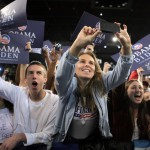The GOP's Electoral Generation Gap

Republicans are poised to win a big victory in the Nov. 2 U.S. congressional elections. Why?
Republicans tell this story: A basically conservative country is rejecting a too-liberal president. Democrats tell another story: Americans are voting against the recession. When the economy recovers, so will the Democratic party.
Let me advance a third and more accurate explanation: It's about the generation gap.
In 2008, Barack Obama and the Democrats benefited from a huge turnout of young voters. Young voters still like President Obama and still prefer Democrats. Voters under 30 give Obama a 58% approval rating. Young voters prefer Democrats over Republicans by 20 points.
The young are the only group that likes the Obama health plan. They think his economic policies are working. Almost two-thirds of them believe that recovery has already begun (as compared to barely one-third of over-65s).
So, question: If young voters like Obama so much, why is the President's party about to be hammered? Answer: Because young voters will not be showing up in November.
Older Americans are always more likely to vote than younger Americans. In 2006, for example, voters over 45 made up 53% of the population -- but cast 63% of the votes.
Older Americans outvote younger voters for many reasons, including:
-America's single biggest social welfare program, Medicare, covers over 65s. America's second-biggest social welfare program, Social Security, pays pensions to over 65s. Unsurprisingly, over 65s vote to keep the money flowing.
-Younger Americans move more often, and so are more likely to drop off the registration roll.
-Younger Americans are more likely to belong to ethnic minorities, especially the fast-growing Hispanic minority, and minority voters have lower turnout at all ages.
The very youngest voters, the under 30s, are the least likely to vote of all, and they are especially unlikely to vote if unemployment is high. The last time a non-presidential election coincided with a year of elevated unemployment was 1994. That year, voters under 30 made up only 13% of the electorate -- and Republicans of course won in a massive landslide.
But as sure as dinner follows lunch, presidential years follow congressional years-- and the big electorate reappears: 49.1% turnout in 1996, 51.3% turnout in 2000, 55.3% turnout in 2004, 56.8% turnout in 2008.
Political scientists argue about why U.S. voter turnout has been rising. An important part of the story seems to be that today's under 30s -- the so-called Millennial generation -- are more politically interested than their predecessors, Generation X.
Millennials take a very different view of politics from older cohorts of Americans. For example, offered a choice between a government that offers higher taxes and more services, or fewer services and lower taxes, older Americans choose the lower-tax alternative.
Sixty-two percent of over 65s prefer the lower tax alternative, as do 58% of voters in the 50-64 group, and 56% of voters aged 30-49.
Under 30s prefer bigger government by a margin of 53-43.
Under 30s are more socially liberal too, and less nationalistic than over 30s.
All these numbers suggest two conclusions:
-Be very careful about projecting forward from the 2010 congressional results to the 2012 presidential vote. These elections almost occur in two different countries.
-Be very careful about assuming that Republican success in 2010 signifies that Republicans have overcome the longer-term problems that I've been writing about these past five years. If Republicans cannot connect better to the huge new Millennial generation, next month's success will only be a happy interval before 2012's grim challenges.
Originally published in the National Post.